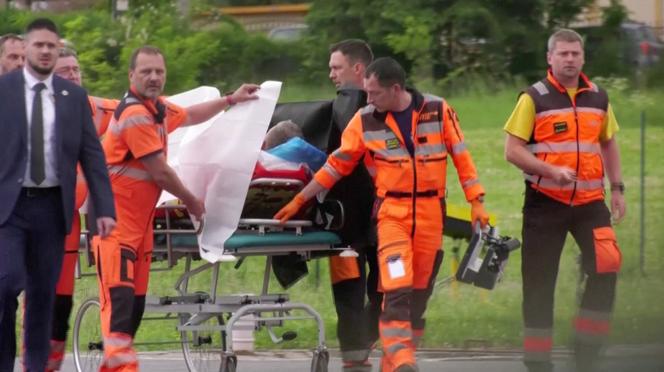


The attempted assassination of Slovakia's populist prime minister, Robert Fico, on Wednesday, May 15, is part of a rising tide of attacks on elected representatives, public officials and activists across several European countries. The campaign for the European elections, to be held from June 6 to 9, has been peppered with attacks on candidates, following years of deterioration of the political climate.
In Poland, Prime Minister Donald Tusk claimed on Thursday to have received threats after the attack on Fico. On X, he posted a screenshot of a comment published on the platform: "Today, the Slovaks have shown us an example of what should be done with Donald Tusk." The political atmosphere in the country has been tense for a number of years. In 2019, the liberal mayor of Gdansk, Pawel Adamowicz, a critic of the conservative Law and Justice party (PiS), then in power, was assassinated.
That same year, on June 2, Germany woke to the shocking news that Walter Lübcke, the prefect of Kassel, had been found shot in the head on his terrace. A year and a half later, his killer, a 47-year-old neo-Nazi, was sentenced to life imprisonment. For the first time since the Second World War, a representative of the state had been murdered by a far-right militant in Germany.
The number of similar attacks in Germany has almost doubled in five years. According to the Federal Criminal Police Office, 2,790 crimes were committed in 2023 against elected representatives or activists from the seven parties represented in the Bundestag, almost half of them against the Greens. In 2019, 1,420 were recorded.
On May 3, the attack on Social Democrat MEP Matthias Ecke, who was hospitalized after being hit on the head by four young neo-Nazis while hanging election signs in his hometown of Dresden, brought the subject back to the headlines. Since then, several politicians have been attacked and injured, including the former mayor of Berlin, Franziska Giffey (SPD), and two regional MPs from Baden-Württemberg, members of the far-right AfD party.
The assassination of Social Democrat Prime Minister Olof Palme on February 28, 1986, outside a Stockholm cinema, traumatized Sweden. The 2003 murder of Foreign Minister Anna Lindh, fatally stabbed in a shopping mall in the capital, in the run-up to the referendum on the euro, reopened that wound. Driven by his "hatred of politicians," her killer, Mijailo Mijailovic, was sentenced to life imprisonment.
Since then, former centrist leader Annie Lööf, who resigned after the September 2022 parliamentary elections, has testified to the scale of the threats made against her and her family. Regularly branded a "traitor to the nation" on social media by far-right trolls, she was also the target of right-wing extremist Theodor Engström, who stabbed a psychiatrist to death on July 6, 2022, during political week on Gotland Island, while she was just a few dozen meters away.
You have 55.98% of this article left to read. The rest is for subscribers only.
